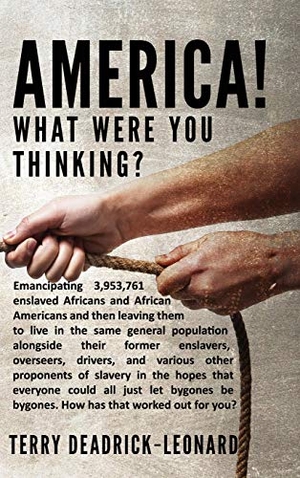The melting pot experiment is the largest social experiment in the history of civilization with 330,417,701 (and counting) voluntary and involuntary participants. However, beyond the long, winding, and provocative title, this book is at its core, simply a glass half-empty or glass half-full proposition. Was the melting pot an experiment that went horribly wrong? Riddled from its inception with flaws that can never truly be repaired. Its people suffering from wounds that will never completely heal. Or is the experiment not only salvageable but proceeding according to its intended design? Capable of one day epitomizing the veritable term melting pot. With no desire to be labeled
Mehr
Weniger
as just another hyperpartisan provocateur pandering to either a left or right-leaning American readership, this book was written in such a way as to allow the reader to interpret for themselves whether or not the melting pot experiment was a failure or a success. And if the reader happens to be an American citizen living inside the experiment, to also decide for themselves whether or not the time has come to abandon the experiment en masse (migration), or if the experiment is by no means over and worthy of the continuation of the fight to make it the more perfect union that it has the potential to become. Written in an age when hard truths are dismissed as mere conjecture and mere conjecture is pandered as hard truth, this book goes above and beyond in a painstaking effort to cite hundreds of historical sources in order to support its premise. This was not only to appease legitimate "fact-checkers," but also those who would criticize the book's premise as being divisive, which is one of the reasons why the book is not afraid of being accused of going overboard with extensively researched citations, definitions, and word etymology of even the most common and rudimentary terms in their antiquated, antebellum, or modern-day usage. The book also acknowledges that in this modern age, writers must be hypervigilant in anticipation of criticism from opponents who would seek to label the book as the defamatory and derogatory "fake news," which has become the new normal in America. This is not because the book is flawed, but because the ideology of its detractors is flawed. Meaning that even though the bars of social and political civility and decorum have been lowered in America, the standards for what constitutes legitimate criticism of the melting pot experiment have nonetheless been raised. The book's tone or mood is that of someone on the outside of America looking in at the melting pot experiment instead of the perspective of someone trapped inside it. It is also written in such a way as to make it both an easy read for most casual readers while still having the potential to be a complement to traditional textbooks required as part of most advanced level social studies, U. S. history, or political science curriculum.
